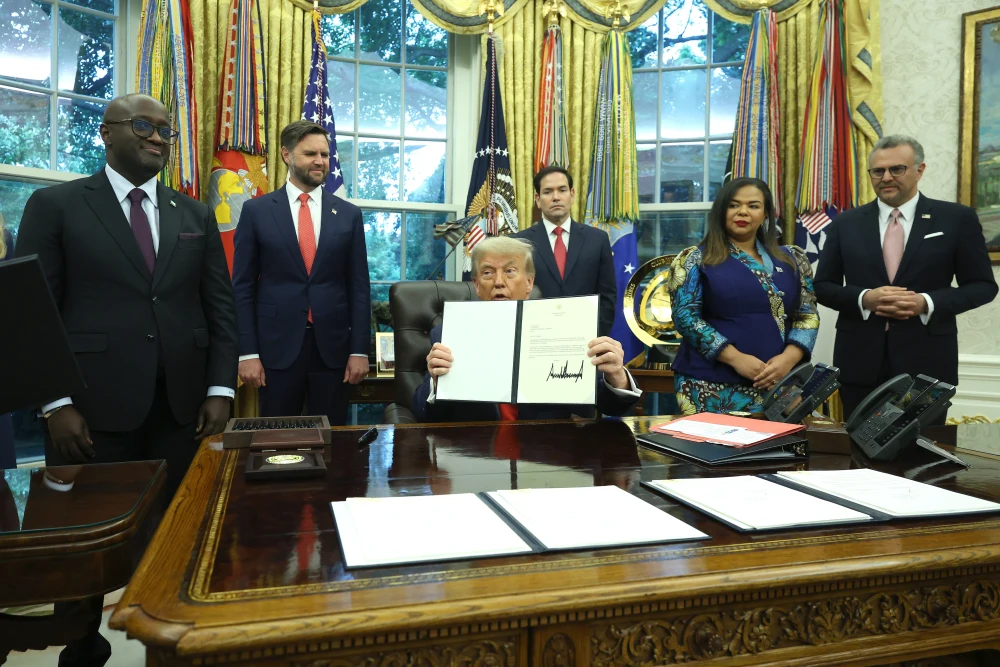Congo, Rwanda reach a U.S.-mediated accord to end decades of tension and deadly fighting – Foxton News

The Democratic Republic of Congo and Rwanda signed a peace accord on Friday in a U.S.-facilitated effort aimed at ending decades of deadly fighting in eastern Congo, while also opening the door for American officials and companies to secure access to vital regional minerals.
“Today, the violence and destruction comes to an end, and the entire region begins a new chapter of hope and opportunity, harmony, prosperity and peace,” President Trump declared during a White House ceremony with the nations’ foreign ministers. Earlier, the pact was officially signed in the State Department’s Treaty Room, beneath a portrait of Colin Powell—America’s first Black Secretary of State—where Secretary of State Marco Rubio called it “an important moment after 30 years of war.”
Congo has endured relentless conflict involving over 100 armed groups since the 1990s, many bolstered by Rwanda, resulting in millions of deaths. While analysts view this deal as a key milestone, they caution it won’t bring an immediate end to hostilities, as the most powerful rebel faction rejects its authority. Many Congolese also suspect that the U.S. seeks to gain mineral resources under the guise of promoting peace.
This initiative aligns with President Trump’s objective to secure critical minerals from Africa, amid growing competition with China for economic and political influence on the continent.
Congo’s Foreign Minister, Thérèse Kayikwamba Wagner, referenced the millions of victims affected by the conflict during the signing alongside Rwandan Foreign Minister Olivier Nduhungirehe. Both emphasized the significance of the agreement while acknowledging that major challenges remain.
“Some wounds will heal, but they will never fully disappear,” Wagner cautioned. “Those who have suffered most are watching—we cannot fail their expectations.”
Nduhungirehe highlighted the “great deal of uncertainty,” noting that past accords failed to materialize. “There is no doubt that the road ahead will not be easy,” he added, but stressed that U.S. and other international support marks a critical turning point.
All three—along with Secretary Rubio—praised Qatar’s role in facilitating these talks at Washington’s request, acknowledging months of diplomatic assistance from Doha.
The deal includes commitments to respect territorial sovereignty, halt hostilities, and outline the disengagement, disarmament, and conditional integration of non-state armed groups.
Pressed in the Oval Office about possible breaches, President Trump expressed confidence in compliance while warning of “very severe penalties, financial and otherwise” for violations.
Why the conflict may persist
The M23 rebel movement, one of the most powerful armed groups backed by Rwanda, captured territory earlier this year in brutal campaigns marked by public executions. The U.N. reports that some 7 million Congolese are displaced—calling it “one of the most protracted, complex, serious humanitarian crises on Earth.”
Congo is banking on U.S. backing to support its push against rebels and force their retreat from key cities like Goma and Bukavu, and from areas believed to harbor up to 4,000 Rwandan troops. Rwanda, for its part, insists its forces are there solely to defend its borders, not to back M23.
Though not part of this peace accord, M23 has dismissed its relevance. Its umbrella group, the Alliance of the Forces du Congo (AFC), has told the Associated Press that “anything regarding us … done without us, it’s against us.” M23 spokesperson Oscar Balinda echoed similar sentiments.
Nduhungirehe noted that parallel negotiations in Qatar aim to bring Congo and M23 to a mutual understanding. Rwanda, he said, will lift “defensive measures,” though it’s unclear whether that includes troop withdrawals.
Rwanda stands accused of exploiting eastern Congo’s rich mineral reserves used in everything from smartphones to military hardware. Kigali denies wrongdoing, while observers argue Rwanda’s economic involvement makes complete disengagement unlikely.
A key front in U.S.–China competition
This peace deal is central to America’s strategic effort to counter China’s expansive footprint in Africa. Chinese firms hold a dominant position in Congo’s mining sector, especially in cobalt, a key resource for global high-tech supply chains.
Congo’s foreign minister praised Washington’s role, calling the U.S. “a reliable partner” both in brokering peace and in future investments. “There is no doubt in this moment … when it comes to the credibility of the U.S. as a partner,” she said in an interview with the AP.
Some analysts believe U.S. engagement will depend heavily on mineral access. The Department of Commerce estimates the country’s untapped ore reserves may be worth as much as US $24 trillion.
Political scientist Christian Moleka of Dypol labeled the deal “a major turning point,” but emphasized it won’t resolve all underlying issues. “The current draft agreement ignores war crimes and justice for victims,” he argued, noting the pact overlooks accountability.
In North Kivu—the region hardest hit—many hope the agreement will curb violence but insist accountability is essential for lasting peace. “I don’t think the Americans should be trusted 100%,” said activist Hope Muhinuka. “It is up to us to capitalize on all we have now as an opportunity.”
Roots of the conflict
This long-running conflict dates back to the 1994 Rwandan genocide, where Hutu extremist militias killed between 500,000 and 1 million Tutsi, as well as moderate Hutu and Twa populations. A Tutsi-led response forced nearly two million Hutu refugees into Congo, many fearing retribution. Rwanda has accused these militants—and in some cases the Congolese army—of enabling genocide perpetrators, posing a continued threat to its Tutsi minority.
In all, six million people have died in eastern Congo since the 1990s, victims of violence, starvation, and disease triggered by ongoing instability.




